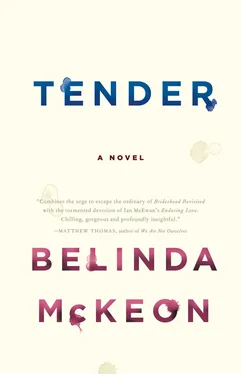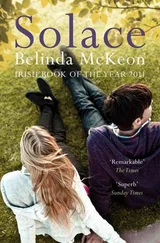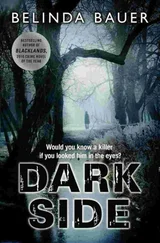“That’s nice.”
James said nothing.
“And is he—” She stopped. What had she even been going to ask? “What does he teach up there?”
“History,” James said, with what could have been a beat of irony in his tone, but the word had come and gone too quickly for Catherine to tell.
“That’s nice,” she said, and immediately winced. “He was always so smart.”
“The scarring is not really visible anymore,” James said then, as briskly as though he was delivering test results. “At least I don’t think so from the photographs he puts up now. A bit”—he put his hand up to his jawline—“a bit of something around here still, maybe, where it was bad, but nothing major. The doctors up there, you know.” He nodded. “He looks good. He looks much the same, actually.”
“Good, good,” said Catherine, in the same tone of absurd brightness. Tell him I was asking after him, she almost said, so efficiently had she whipped herself up, now, into this state, into this welter of refusal and pretending. This was not happening. This was not real. She was not on a scrap of scrubland off the coast of East Harlem, gripping a ridiculous plastic beaker, sweating into her fancy clothes, being pulled by the quiet, serious voice of James Flynn into the summer of fourteen years before.
“Catherine,” James was saying now. “You know, what happened was terrible.”
“Yes,” she said faintly.
“I don’t just mean Liam. I don’t just mean”—he cleared his throat—“that day. I mean the whole thing.”
“Your photos, the photos you took that day, were unbelievable,” she said. “They were so moving.”
He shook his head. “What was I doing, taking fucking photographs?”
“James.”
“No. What was I doing? Taking photographs in a hospital, for fuck’s sake?”
“They were important. They were very powerful. They still are.”
“I don’t know. I can’t look at them. I don’t know if I’ll ever be able to look at them.”
“You should be proud of them.”
“I don’t know.”
“I’m proud of them for you,” she said, and she reached out to him, and she touched his arm, but it all seemed to happen in slow motion, and it all seemed stilted, stunted; it all seemed strange. James drew back a little at her touch — she did not think she was imagining this — and so the sentence that she was already rolling out to follow the first one, the one in which she said it to him, the one in which she told him, seemed ill-judged now, seemed like an ugly, distasteful flare. But, “I’m proud of you, ” she said it anyway, had said it, before she could stop herself, and in response to that, James actually stopped in his tracks; James froze, and James looked at her.
“Don’t, Catherine, please,” he said.
“I’m sorry,” she said, horrified, mortified, not even sure what she was apologizing for. “Never mind me, never mind me.”
“It’s not that it’s not nice of you to say something like that.”
“No, it was stupid. Of course it was stupid. We don’t know each other anymore. It’s not my place.”
“No, it’s not that,” he said, walking again now, shaking his head. “I mean, yes. Of course yes, we don’t, you know — it’s true. We don’t know each other anymore.” He sighed. “Which makes me sad, actually.”
“Me too.”
“But, you know,” he said, “this is how it is. Time moves. It takes you with it. Life changes. You know?”
There was far more to it than that, Catherine thought, but she did not say this. She nodded. “I’m sorry about what happened, James,” she said. It seemed hopelessly inadequate, but it had to be said. It should have been said many years previously. She had tried; she had started the letters. But his own letter, written to her a week after what had happened, had been clear. No more. No contact. No way; no explanations; no point. It had been unfair to keep Baggot Street from him, to keep the girls from him — they had been his friends first, after all — so she had found a flatshare with some other people from college in Ranelagh. Zoe had come home from Italy; Zoe had been her friend. Emmet had come home; Emmet had been more than she could ever have believed Emmet could be to her. Heartbreak, in the end, too; heartbreak enough to make up her mind about moving to London; heartbreak, in its way, far worse than it had been, a year previously, with James; was that irony? Was that a justice somehow served? Was that just life?
Yes, yes, probably that was just life.
“I’m sorry,” she said again. “It’s not enough, it’s not even a beginning, but it’s true, James.”
“It wasn’t your fault.”
She stared at him. “What?” she said, and she almost laughed. “Of course it was my fault. If it wasn’t for me—” She shook her head. “You shouldn’t even have been up there. Either of you.”
“No,” he said firmly. “You see, that’s not true. We should have been able to be anywhere we felt like being, anywhere we wanted to be. Everybody who was there that day should have been able to be there. Without that. Without being blown to bits by a bunch of fucking psychopaths.”
“But that’s different,” Catherine said, frowning. “That’s a separate thing.”
“No,” James said, shaking his head. “You didn’t do that to us.”
“I did part of it. I did enough.”
“No,” he said firmly. “There’s no point in telling yourself that. If you want to tell yourself, that’s another matter. That’s, however you put it, a separate thing.”
He was not trying to comfort her, Catherine realized. He was not trying to take something painful away. It was as if he was trying to tell her that something painful had never been hers to hold on to at all.
“You were supposed to be in Baggot Street that weekend,” she said, “the two of you. You were going to come for dinner, stay the night…”
He made a noise of disbelief. “Why would we need to stay the night? We didn’t need to use someone else’s house. We would have gone home to Liam’s place, or to mine.”
“It was something I heard Lorraine suggesting. That you would stay. Make a weekend of it. And then there was the photo.”
“What photo?”
“The photo of Liam.”
He squinted at her. “The photo of Liam was taken afterwards.”
Not that photo, she wanted to say, but there was no point — there was no point in raking this over. It was so long ago. It had been, anyway, such a small thing.
But James was still frowning, still shaking his head. “You must be misremembering, Catherine. That doesn’t make any sense.”
“I think the idea was—”
“Because we weren’t hiding,” he said over her.
“Yes, you were,” she said quietly.
“No,” he said sharply. “No, we weren’t. Hiding from you, maybe. But that was different. That was”—he changed his intonation—“a separate thing.”
“So you do blame me.”
“Blame?” he spat. “I blame the bastards who parked that car. I blame the bastards who stole it, the ones who drove it up there knowing—”
“But you were up there because of what I did,” Catherine said, and she saw, then, a bin, and she threw her coffee into it; it landed with a slosh.
“You weren’t really into that, were you?” James said, and she was astonished to see that he was almost laughing. She stared at him.
“Do you even know what I said to him? What I told Liam that day?”
“You told him we were fucking,” James said, in the same vaguely bemused tone. “And you said I was — how was it that your mother put it that time?”
“My mother? ”
“Troubled,” James said, nodding in evident satisfaction at having remembered the word, or at having had the chance to present it. “Troubled, that’s what you said I was. Which he had no trouble, so to speak, believing. The rest of it, though”—he shrugged—“sure, all he had to do was ask me.”
Читать дальше












